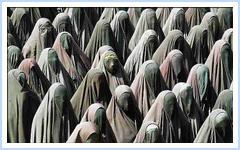

Canada's diplomatic missions in London and Paris are being targeted by
anti-Sharia law protestors next week. Nearly 100 international groups denouncing the province of Ontario's decision to allow faith-based arbitration, saying that is suppresses women's rights and sets a bad example for those lobbying for Sharia law in Europe. "A lot of French people cannot believe it, because for us, Canada is a country with very good rights for women. It is unbelievable,"
Michèle Vianès, president of French NGO Regard de femmes told the
Globe and Mail yesterday. Ms. Vianès will protest outside the Canadian Embassy in Paris alongside high-profile French activists, politicians, and representatives from human rights and women's movements. Similar action is set to take place outside the Canadian High Commission in London, and in Stockholm, Amsterdam and Düsseldorf.
http://www.embassymag.ca***
The following story provides more details on times and places one might assemble to lend support to the universal implementation of women's rights. In the area of Human rights there are no exceptions for religious bigots. Rights for women cross all religious boundardies. Universal Human rights are for everyone. No exceptions.
***
By MARINA JIMÉNEZ
Tuesday, August 30, 2005 Updated at 5:09 AM EDT
From Tuesday's Globe and Mail
A campaign against Ontario allowing sharia tribunals to resolve family disputes has spread to Europe, where protests are planned for Sept. 8 in London, Paris, Amsterdam, Düsseldorf and Stockholm.
As many as 89 international groups have spoken out against an Ontario law allowing faith-based arbitration, saying it will create a precedent for religious fundamentalists working to suppress women's rights, and give fodder to political Islamists in Europe who are also lobbying for sharia law to be used to settle family matters.
"A lot of French people cannot believe it, because for us Canada is a country with very good rights for women. It is unbelievable," said Michèle Vianès, president of Regards de femmes, a non-governmental organization in France. "Under sharia, women do not have the same rights as men. Sharia is a bad idea. How is it possible that Canada would back it?"
Ms. Vianès will demonstrate outside the Canadian Embassy in Paris next Tuesday, alongside a number of high-profile French activists and politicians, including two former government ministers, the vice-president of the municipality of Lyon-Grand, dozens of writers, and representatives of human rights and women's groups.
Similar protests will take place outside the Canadian High Commission in London (in an event organized by the British Humanist Association, a human rights group whose international branch has consultative status with the United Nations), in Stockholm, Amsterdam and Düsseldorf, as well as in Toronto, Vancouver, Victoria, Ottawa, Montreal and Waterloo, Ont., said Homa Arjomand, co-ordinator for the International Campaign Against Sharia in Ontario.
The issue of sharia-based tribunals in Ontario is causing alarm in Europe, where Muslim feminists fighting for greater equality clash with conservative Muslim groups lobbying for faith-based family law.
"It is a battle to control the discourse of the religion. In Canada, political Islamists are using the tool of multiculturalism and freedom of culture and religion to oppress women. The introduction of sharia courts in Ontario would send the wrong message to the world," said Ms. Arjomand, who fled Iran in 1989 and settled in Toronto.
Rights and Democracy, a Montreal-based non-governmental organization, has also lobbied against faith-based tribunals, and won backing from 80 national organizations including the Canadian Federation of University Women, the Canadian Council for Muslim Women and the YWCA. The United Nations Special Rapporteur on Violence against Women, Women Living under Muslim Laws and dozens of other international groups have joined the global campaign.
Ontario's Arbitration Act from 1991 provides for voluntary faith-based arbitration to resolve civil and family-law disputes. This allows Muslims, Jews and other religious groups to use the principles of their faith to settle matters such as divorce, inheritance and custody outside the court system.
In 2003, Syed Mumtaz Ali, a retired Muslim lawyer, established the Islamic Institute for Civil Justice, with an aim to train imams and religious scholars to resolve civil dispute in the community, a process already under way informally.
His announcement prompted the Ontario government to appoint former NDP attorney general Marion Boyd to review the Arbitration Act. She concluded there was no evidence women were being discriminated against in faith-based arbitration and recommended the existing arbitration system be strengthened. The Ontario government has not yet responded to the report; a spokesman for the Attorney-General did not comment on the growing international outcry.
Sharia, a body of law based on religious principles, is interpreted differently even among Muslim nations. However, critics say it is inherently discriminatory toward women. Male heirs receive a greater share of an inheritance than female heirs; husbands, not wives, may initiate divorce proceedings; and in divorce cases, fathers are generally awarded custody of daughters who have reached the age of puberty.
While in theory, faith-based arbitration must comply with Canadian civil law and decisions may be appealed, in reality, many Muslim women are isolated, with no idea what their rights are under Canadian law, Ms. Arjomand said.
"These international demonstrations reflect the concern that Ontario's approval of faith-based arbitration of family law will have serious consequences for women's rights beyond Canada, and that's a responsibility we urge the Ontario government to consider," said Gisèle Eva Côté, of Rights and Democracy.
***
We urge you to lend your support to women oppressed by whimmitude. We urge that you demonstrate against sharia in Canada.
Support Mulsim women's rights in support of the rights of all people everywhere.





No comments:
Post a Comment